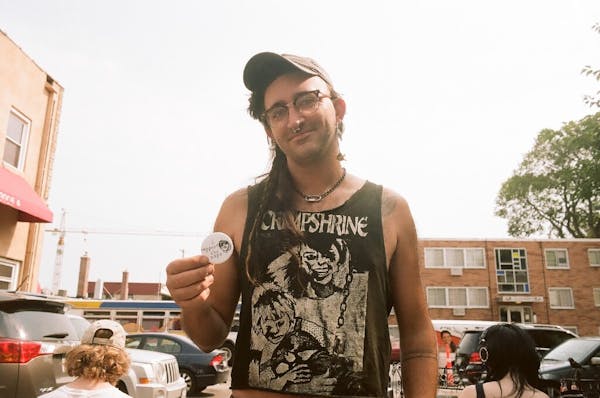Sometime in October, the city of Minneapolis is likely to find itself owning a shopping center on E. Franklin Avenue.
Such an occurrence would mark the final chapter in the 30-year relationship between the city and a nonprofit developer that sought to transform Franklin, bringing jobs and business opportunities to residents.
City ownership might last for only a couple of weeks, if other, smaller lenders buy out creditors such as Minneapolis and Franklin Bank in a foreclosure redemption. Or it could stretch for months or even years if those junior creditors decide the property isn't worth what they'd have to pay.
The foreclosure follows a 2010 bankruptcy filing by Great Neighborhoods Development Corp., once touted by city officials for turning Franklin from seedy to shiny with public financial help. Great Neighborhoods built the Franklin Circle Shopping Center and three nearby buildings, building at the same time a national reputation for developments that helped diminish crime. But its bankruptcy and pending foreclosures ended its track record after a failed attempt to transfer its skills to the North Side.
"There's no way to make [the situation] look good. It's bad," City Council Member Lisa Goodman said before the council authorized the foreclosure redemption last week, including the use of as much as $2.5 million from reserves.
Minneapolis also needs to line up in the foreclosure process to reclaim loans that Great Neighborhoods secured with real estate. The city expects to lose most of the $1.2 million in unsecured debt that the organization owes it.
Minneapolis will take ownership if it decides the center is worth what it would need to pay Franklin Bank. Then, if no junior lender buys the city out, it will market the property when economic conditions warrant.
Stores will continue to operate.
The nonprofit built its reputation on Franklin Avenue under the name American Indian Neighborhood Development Corporation, then changed it once it decided to tackle development elsewhere, a move that native critics said betrayed a community.
Loan from the city
Over the 30 years, the city kept modifying its 1981 $550,000 loan to the nonprofit as the organization asked for more favorable terms, eventually swelling to $806,000 by 2007. Although the city required Great Neighborhoods to pay down $407,000 of that debt and $559,000 in other loans when it sold a nearby property in 2007, it extended the original loan to 2027, or some 46 years after it was made.
The city also allowed Great Neighborhoods to invest $641,000 of the proceeds from the property sale in a leap the organization made to W. Broadway in north Minneapolis. It accumulated land there, as well as additional debt, with a stab at an even more ambitious development that ultimately triggered the bankruptcy.
The city aided the development effort with grants and a loan, with encouragement from Mayor R.T. Rybak and other officials who thought that Great Neighborhoods could duplicate on the North Side its success in a high-crime, high-poverty area of Phillips. It didn't.
Minneapolis' investment could have been bigger had Goodman, chairing the council's community development panel, not balked in 2008 at a proposed $1 million city grant to the W. Broadway project. She said she reluctantly agreed to $432,000 after lobbying by City Hall supporters of the grant.
Rybak called the nonprofit's Broadway flop "a major disappointment" but said it has to be viewed against multiple successes there, including the recruitment of Cub Foods, renovation of the Capri Theater, and successful developments by the Catalyst nonprofit.
Criticism in Franklin
Others felt betrayed when Great Neighborhoods used equity from its Franklin developments to finance pre-development costs on Broadway. Some detractors said that the nonprofit traded on its roots in developing Indian-owned businesses and jobs for natives to raise money, then changed its name and mission, leaving a sense of abandonment for the community.
"When a [nonprofit] can invest and then disinvest in a community, that's not right. ... When you're using public money to disinvest in a neighborhood, that's a travesty," said Robert Albee, co-founder of another Franklin-area nonprofit.
In a 2008 interview, Great Neighborhoods Executive Director Theresa Carr denied equity stripping, saying the use of property sales proceeds to help on Broadway was only temporary. She said this week that she began looking for a new area in which to develop commercial real estate once for-profit developers began sniffing around Franklin.
During her tenure, the organization redesigned and revitalized the shopping center, created the Ancient Traders Market to house such businesses as Maria's Cafe, and ushered in the new Franklin Street Bakery, adding local jobs on the site of an eyesore gas station.
In 2006, Great Neighborhoods began buying land along Broadway, eventually accumulating more than a full square block. It started to tout plans for a 122,000-square-foot, 24-hour YWCA as an anchor tenant, along with 40,000 square feet of retail space and a 300-car ramp. But the YWCA canceled in late 2009 when Great Neighborhoods' fundraising languished as costs mounted.
Now, developer George Sherman has been looking into the W. Broadway site, while the Native American Community Development Institute is examining whether it's feasible for the Indian community to regain the Franklin shopping center.
That nonprofit's president, Justin Huenemann, said Great Neighborhoods faltered when it forgot its community development roots and started thinking more like a developer.
Meanwhile, Carr, who reported compensation of $185,407 in 2009, said she's one of two staffers working unpaid in her basement to keep Great Neighborhoods going. She said she's hoping to do so by advising developers in other high-crime areas nationally on what worked on Franklin.
Steve Brandt • 612-673-4438
Charge: Driver going 77 mph ran red light, fatally hit man crossing St. Paul street, kept going

Second teen suspect arrested in Minneapolis 'Nudieland' mass shooting that killed 1, injured 6
Charges: Friendly fire killed man standing among group who shot at moving SUV in south Minneapolis

Lakeville public safety training facility gets $800K in federal funding

